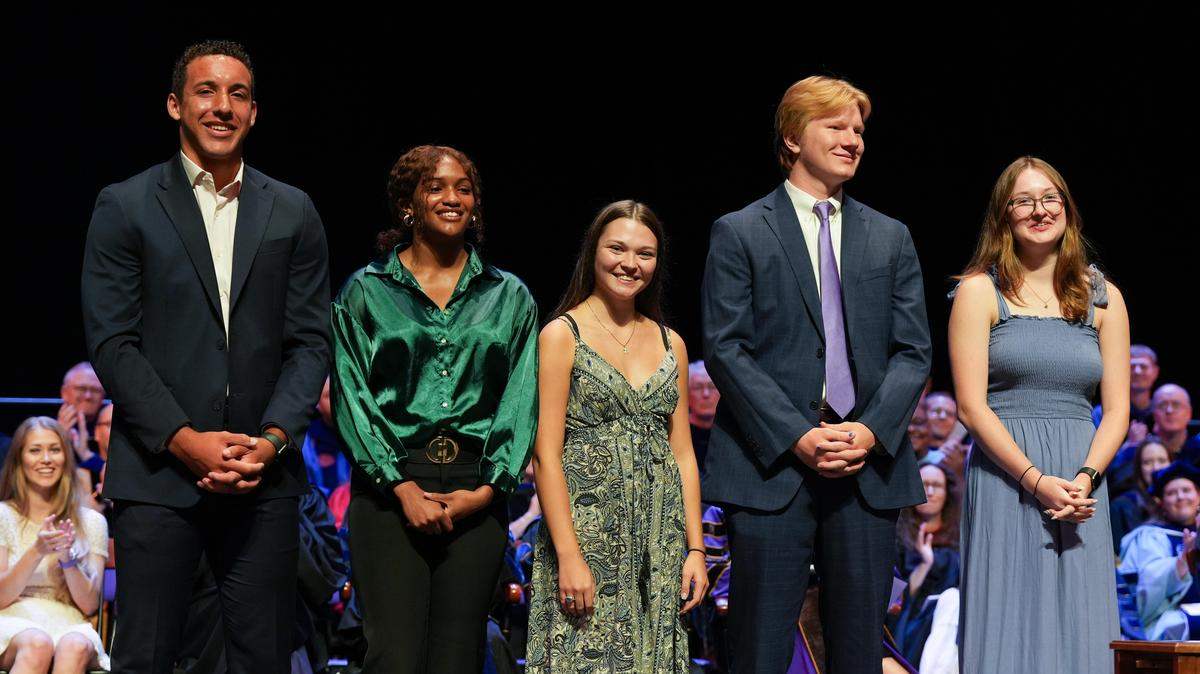The Furman Fellows award, among the highest honors bestowed on Furman students, recognizes five seniors based on their accomplishments, contributions and potential.
Students apply to become a Furman Fellow in the spring of their junior year. Applicants are required to propose and execute a project during their senior year and present their work at Furman Engaged. Proposed projects may include but are not limited to independent research (e.g., thesis, continuation of a summer or course project), a creative work (e.g., recording, theater production, art installation), a community project (e.g., on-campus or in the Greenville community), or an entrepreneurial endeavor (e.g., creation of a business or piloting/prototyping an idea).
Furman Fellows are selected based on the content of their application, including the project they propose, as well as faculty and staff recommendations. Successful applicants are those who aim to make a difference at Furman and in the broader community, bring creativity and imagination to their daily lives, demonstrate distinctive problem-solving abilities, and are respected by their peers and faculty.
Each Furman Fellow receives $10,000 thanks to the generous philanthropy of Trustee Emeritus Bob Buckman and his wife, Joyce Mollerup. The award is intended to encourage recipients to pursue their academic, creative and professional pathways.
Applications for the Furman Fellows Class of ‘25 are due Friday, March 15 and can be found using the link below.

Class of 2024
A physics major, will develop his “Power of Pedaling” project to generate clean energy in communities with limited access to electricity by attaching small-scale generators to the bicycles often used for transportation in those areas. “A charged battery can be removed from the device at the end of the day to power a lamp or cooktop in the home, and suddenly bikes are serving the dual purpose of mobility and clean electricity production,” said Ashby.
A politics and international affairs and Africana studies double major, has proposed “The Bridge,” a project intended to “establish a connection of familiarity, understanding and trust” between people of color and local police officers. Monthly gatherings and dialogues can “shift the narrative of ‘all cops are bad’ and that ‘Black means threat,’” said Hill-Mims, who plans to use a summer internship in the 13th Judicial Circuit Solicitor’s Office to begin networking.
A French and politics and international affairs double major, will focus on “Consent Education at Furman,” aimed at increasing campus safety by developing a comprehensive program for students entering the university. McCarty plans to collaborate with students, professors and academic deans to research effective means of consent education “to equip students with knowledge so they can make the best decisions for themselves both while they are at Furman and long-term.”
A business administration major, proposed “Artistic Flow” to “provide access to an artistic experience and a creative outlet to participants to improve their mental health and individual growth.” By creating a mobile art studio equipped with potter’s wheels, easels, chairs and other art supplies, O’Connor intends to spread the mental and emotional benefits he gained in his own artistic pursuits, including “stress relief and improved focus and concentration, self-expression and increased self-awareness,” he said.
A psychology and French double major, plans to spread awareness of autism spectrum disorder and other disabilities through a “Disability Allies” program. Working with Furman’s Student Office of Accessibility Resources (SOAR) and the Center for Academic Success, Warren envisions a series of workshops and dialogues that will eventually lead to an official certification for students, faculty and staff as a Disability Ally, “fostering a campus which includes those with disabilities we cannot outwardly see,” she said.
